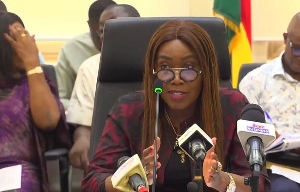Religion of Wednesday, 30 November 2011
Source: Abdur Rahman Shaban Alfa
The New Islamic Year 1433 AH
INTRODUCTION
Even before the Gregorian calendar of 2011 officially ends on December 31, Muslims have already started a New Islamic Year as per the Islamic calendar which differs from the Gregorian on the basis of the number of days in each of its 12 months.
It only so happens that the Islamic Calendar virtually nonexistent in the lives of adherents of the faith (Islam) except at particular times of the year; these times are usually tied to festivities in the Muslim life.
Specific mention can be made of the two Eids (Fitr and Adha), Ramadan and Zul Hijjah.
Ramadan, the ninth month, being by far the most popular amongst the rest, as its buzz resonates far beyond Muslims and most times grips the entire society.
Zul Hijjah, is popular by virtue of the fact that it is in that month that prospective pilgrims make the sacred journey to the House of Allah in Saudi Arabia allied with other activities to seek Allah’s forgiveness and providence.
STATEMENT OF ISSUE
Zul Hijjah which is also the twelfth month of the year should ordinarily had been a key moment when Muslims reflect on the gone months as it ushers us into a new year as per the Hijriyyah Calendar calculations. This sadly is not the case.
Two reasons I can adduce for that; the social milieu within which we find ourselves is one that embraces the Gregorian date and yearly calculations, moreover; Muslims seem to have our bearing preferring to leave aside our own dates and I must say, very unique calculation of months and years.
Unique in what sense a person may ask; simply for that fact that application of the Islamic calendar to a large extent signifies obeisance to Allah’s Law; the months are based on the moon; a creation of Allah the Almighty.
This is the direct opposite that is based on a hard and fast, straight jacketed module that was couched years ago (supposedly 2011 years after the death of Prophet Isa (Jesus); the last but one Messenger of Allah as per Islam).
But are the two reasons enough for us to discard the Islamic dates? Certainly NOT! If for nothing at all, a blend of both dates at any given opportunity would be a better state of affairs than what currently pertains.
PROPOSED SOLUTION
The solution to this indictment and grave ‘oversight’ lies in two words: Conscientization and Continued Use of the date especially at ALL Muslim gatherings.
The first point of call shall be with Muslim leaders irrespective of which part of the religious banner the hold, to make it a point to at all events be they naming, marriage or funeral ceremonies to remind all gathered of the Islamic date.
Another very potent platform on which to best drum home the date to Muslims is on the Friday Congregational Prayer pulpits.
Then are teachers at most Madrasas – Islamic Schools – they might as well play the most important long term role of pushing down the concept of the Hijriyyah date into the minds of young Muslims that they teach.
We cannot lose sight of the media and technological bit in the general scheme of events; what stops well-to-do Muslims from paying to publish each month of the Islamic calendar in a number of daily newspapers? I wonder.
All hosts of Islamic programs must make it a point to quote the Islamic date each time they are on set. In the long term, we should get slots at peak periods of programming to put in a reminder of the Islamic date.
If done; that would imply giving a wider scope to the publicity of the concept not only to Muslims but to non Muslim alike. Muslims on social platforms like facebook, twitter and myspace should always quote the Islamic dates; certainly would it be a reminder to other Muslims and a strong message to non Muslims.
Last Saturday; November 26, 2011, was the day that Muslims ushered in a New Year as per the Islamic calendar. The New Year is 1433 Hijriyyah.
QURANIC VERSES RELATING TO TIME (All quotations derived from Sahih International)
Verily, the number of months with Allah is twelve months (in a year), so was it ordained by Allah on the Day when He ... Sacred, (i.e. the 1st, the 7th, the 11th and the 12th months of the Islamic calendar). That is the right religion, so wrong not yourselves ...
Surah 9: 36
They ask you, [O Muhammad], about the new moons. Say, "They are measurements of time for the people and for Hajj." And it is not righteousness to enter houses from the back, but righteousness is [in] one who fears Allah. And enter houses from their doors. ...
Surah 2:189
[He is] the cleaver of daybreak and has made the night for rest and the sun and moon for calculation. That is the determination of the Exalted in Might, the Knowing.
Surah 6:96
It is He who made the sun a shining light and the moon a derived light and determined for it phases - that you may know the number of years and account [of time]. Allah has not created this except in truth. He details ...
Surah 10:5
And the moon - We have determined for it phases, until it returns [appearing] like the old date stalk.
Surah 36:39
The sun and the moon [move] by precise calculation,
Surah 55:5
The moon finds its way into every of the above verse and many more times in the Quran, signifying its importance to Islamic monthly and yearly calculations. The importance of the lunar crescent is also partly the explanation for why many countries with predominantly Muslim populations have a crescent shape on their flags.
THE ISLAMIC CALENDAR
The similarities between the Islamic and Gregorian calendar are that; both have 12 months each of seven days in a week. The slight day variations are that the first day of the week is Sunday (Yawmul Ahad) whiles Monday is seen as the first on the other side.
Unlike the Gregorian 365/366 days, the Islamic year has only 354 days. This is because the Islamic Calendar (or Hijri Calendar) follows the movements of Earth's Moon. The Hijri Calendar is consistently less by 11 days comparative to the Gregorian.
Like much of Islam, the calendar is based on the Quran and on personal reflection of the relationship between Muslims and Allah. Each month of the Islamic Calendar officially begins when the lunar crescent is first seen after a new moon.
This is not always an exact time, especially if the skies are cloudy or overcast. In a sense, the start of each month can be different for everyone. Many people, however, prefer to rely on an official announcement by Muslim authorities as to when each month begins.
The 12 months of the Islamic Calendar, in order are these:
1. Muharram
2. Safar
3. Rabi' al-awwal
4. Rabi' al-thani
5. Jumada al-awwal
6. Jumada al-thani
7. Rajab
8. Sha'ban
9. Ramadan
10. Shawwal
11. Dhu al-Qi'dah
12. Dhu al-Hijjah
The Calendar is properly called the Hijri Calendar because it began with the Hijra, or hegira, The Holy Prophet Muhammad's flight from Medina to Mecca, due to persecution by the disbeliever of the time. Gregorian calendars measure time beginning with the year 0 A.D.
On the Gregorian calendar, A.D. stands for Anno Domini, which means "In the year of our Lord." The Hijri Calendar has years marked by A.H., which stands for Anno Hegirae, "In the Year of the Hijra." The hegira took place in A.H. 1.
The Hijri Calendar is the official calendar in many predominantly Muslim countries, most notably Saudi Arabia. In other countries, Muslims refer to the Gregorian Calendar for most dates and consult the Hijri Calendar only for religious purposes.
CONCLUSION
For us, first Muharram is akin to January 1, and is a day worth celebrating in every sense, this is the time that we Muslims are ideally supposed to call New Year’s Day. For far too long, we have failed as a collective to drum home the need to use our Islamic dates along with the Gregorian dates, but better late they say than never, from this year and for many years to come there certainly must be a concerted and calculated effort to hype the occasion and to celebrate it as such.
From our Imams, through to Muslims in the media, Islamic school teachers and any Muslim Abu, Musa or Amina living any and everywhere, ours is the onerous duty to make do with what is ours from the Almighty Allah.
Written this day 4th Muharram, 1433 (November 29, 2011)
© Abdur Rahman Shaban Alfa
Teacher, Hamdaniyya Islamic School, Accra New Town
alfarsenal@yahoo.com, newcguide@gmail.com












